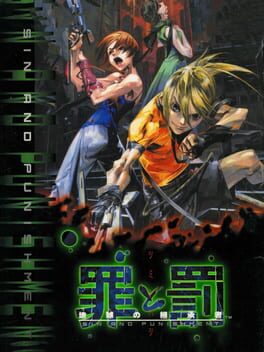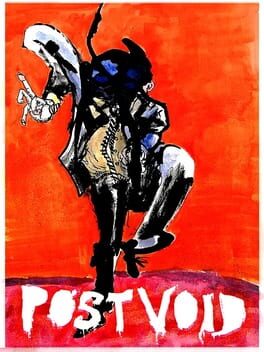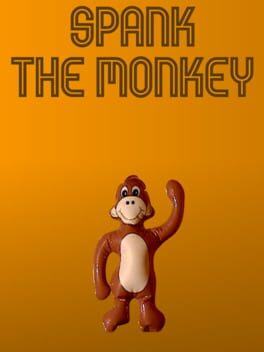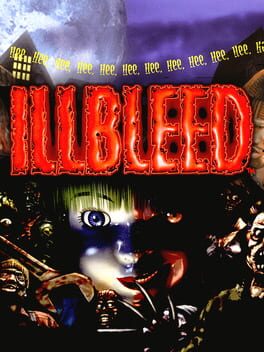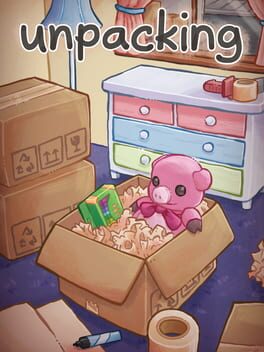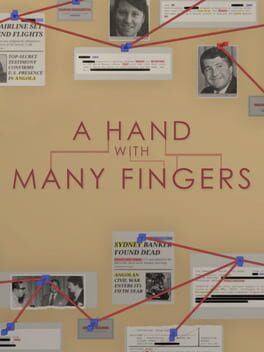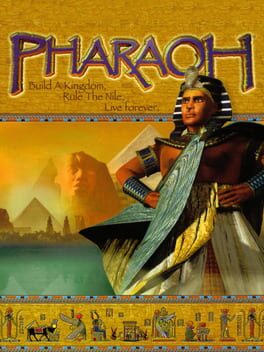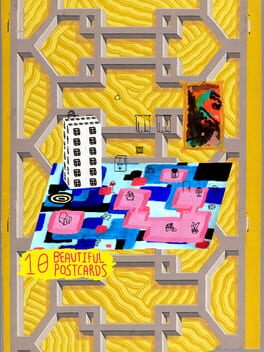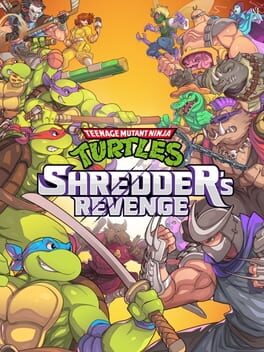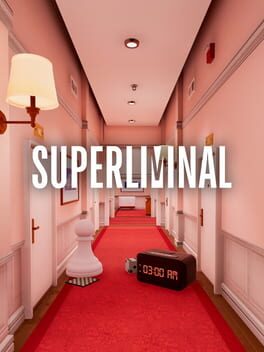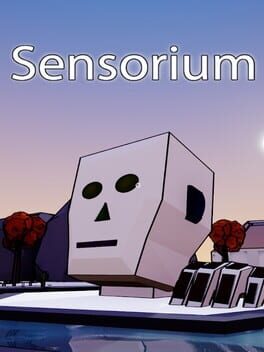FMTownsParty
2000
(I didn't have this logged already...?)
The ever-shifting perspective in Stage 2-2 (the aircraft carrier level) is one of the biggest flexes that the genre has ever experienced, and it being on the N64 of all consoles makes it even better.
I emulated this game but I could still hear the hardware crying.
The ever-shifting perspective in Stage 2-2 (the aircraft carrier level) is one of the biggest flexes that the genre has ever experienced, and it being on the N64 of all consoles makes it even better.
I emulated this game but I could still hear the hardware crying.
2020
At first I was annoyed by the clutter - here is a game where just shooting well and typing WA and WD in a rhythm is more effective than the /actual/ avoidance mechanic provided (esp. once you get the bullet-slowing perk), but I've come to accept that in Bayonetta-like fashion, the true and best path forward is simply killing better while maintaining just enough lucidity to recognize shapes and motions. If you wanna add something to that, feel free - otherwise, get your aim right.
Regardless of the game quality itself, there's a genuine stroke of genius in putting an "unofficial" playlist on Spotify to tie into an achievement you can only get if you listen while playing. Not since Space Funeral have I seen such a harum-scarum approach to licensing.
Regardless of the game quality itself, there's a genuine stroke of genius in putting an "unofficial" playlist on Spotify to tie into an achievement you can only get if you listen while playing. Not since Space Funeral have I seen such a harum-scarum approach to licensing.
2004
2001
I have to admit, I knew a lot about this game going in. I've seen the deviousness of the first level, I understood the main mechanic and how to apply it, I even knew that Eriko was pretty much the only character worth playing. However, I don't think any prep short of being completely spoiled would adequately set you up. Because once you're past the Banballows? You couldn't predict a single move Illbleed pulls if you had a gun to your head.
Game development doesn't really work like this, I know, but never before has a game felt so driven by whimsy alone. Drifting from one idea in this completely free-wheeling state of mind where the connection between a talking cake and a grill that turns meat hostile makes sense together simply because they were thought in close enough proximity. Or maybe it just feels that way because the ideas never go above or below wouldn't-it-be-funny-if levels of consideration. And I honestly wouldn't have it any other way!
Unfortunately, even with its lean 6-ish hours of runtime (add a few for the true ending, and a couple more if you're really struggling), a chunk of that effort will be spent rationing the most rancid salads ever digitized and ambling from point A to B to reduce bleeding. I can absolutely respect conflict in my game design, and I do admire how Illbleed's survival-isms are ridiculously complex and overlapping for a game about a spooky theme park, but ultimately, the drive of this game doesn't lie here, and the insistence of being a part of the game so often only chafed against me. This extends to the level design and encounters, too. I played this with a friend and we both made a comment at some point about how annoyed I sounded every time I looked at the map and got nauseated by what's ahead.
(It makes sense, then, that this game has been mostly preserved in the form of Let's Plays where this sorta thing can be defanged for the audience.)
As noted in other reviews here, this game really does feel self-prophesizing in who it attracts. If you're capable of getting past Level 1, you're probably there until the end. Hell, even if you're not, just look it all up or something. Illbleed doesn't strike me as a game concerned with the means. Much like its B-horror roots, it's about having a good time on both sides of the screen.
Game development doesn't really work like this, I know, but never before has a game felt so driven by whimsy alone. Drifting from one idea in this completely free-wheeling state of mind where the connection between a talking cake and a grill that turns meat hostile makes sense together simply because they were thought in close enough proximity. Or maybe it just feels that way because the ideas never go above or below wouldn't-it-be-funny-if levels of consideration. And I honestly wouldn't have it any other way!
Unfortunately, even with its lean 6-ish hours of runtime (add a few for the true ending, and a couple more if you're really struggling), a chunk of that effort will be spent rationing the most rancid salads ever digitized and ambling from point A to B to reduce bleeding. I can absolutely respect conflict in my game design, and I do admire how Illbleed's survival-isms are ridiculously complex and overlapping for a game about a spooky theme park, but ultimately, the drive of this game doesn't lie here, and the insistence of being a part of the game so often only chafed against me. This extends to the level design and encounters, too. I played this with a friend and we both made a comment at some point about how annoyed I sounded every time I looked at the map and got nauseated by what's ahead.
(It makes sense, then, that this game has been mostly preserved in the form of Let's Plays where this sorta thing can be defanged for the audience.)
As noted in other reviews here, this game really does feel self-prophesizing in who it attracts. If you're capable of getting past Level 1, you're probably there until the end. Hell, even if you're not, just look it all up or something. Illbleed doesn't strike me as a game concerned with the means. Much like its B-horror roots, it's about having a good time on both sides of the screen.
2021
Contained herein is reasonable evidence to suggest that Thom Yorke and Stanley Donwood, decades before their "game" debut, were better environmental storytellers than just about anyone who has worked on a game with "-shock" in the title.
On a less caustic note, this is a pitch-perfect accompaniment for two albums that I thought would never be capable of eliciting strong feelings from me again after wearing them out in my younger years. Wish there was a Optimistic sequence but the triple-threat of How To Disappear/Pyramid Song/You and Whose Army? will make up for it.
On a less caustic note, this is a pitch-perfect accompaniment for two albums that I thought would never be capable of eliciting strong feelings from me again after wearing them out in my younger years. Wish there was a Optimistic sequence but the triple-threat of How To Disappear/Pyramid Song/You and Whose Army? will make up for it.
I wouldn’t go into A Hand With Many Fingers expecting a singularly fascinating mystery to uncover. It has strengths! But I would say they are in two, disappointingly parallel traits. On one hand, it is a subtly burdensome emulation of a mystery blooming. The archives are designed with a clever inefficiency that draws out paranoia and itchy obsessiveness, giving you just enough space and ambiguity to stretch out the red twine. In the connecting lobby of the archive is a large, exposed window overlooking the opposite side of the street. Just once in my full 1.25 hour long playthrough, a light was on in an apartment as I ascended the stairs, and before I could make any shapes out, it flicked off. Things like this happen every-so-often, and put just enough static in your mind to never feel fully comfortable. It doesn’t help that Reagan is gnashing away on some poor CRT in your periphery the entire time.
On the other hand, this is explicitly based on a true story of a conspiracy centering the CIA, drug trafficking, and arms dealers, so there’s an inherent edge and, dare I say, glamour to it all. Frankly, I don’t know how you’d possibly convince someone that this game’s subject matter wasn’t baseline fascinating considering there’s an actual aftermath that, regardless of its success, the game would be guiding you towards.
That’s kinda the problem, though. While the game trots around a more and more complicated set of names, locations, and events, the contents of said texts reveal themselves to be actually quite bare with stimulating information. As convenient as it is that the game highlights all mechanically important information, it does lead to a bit of tunnel-vision, especially near the end of the game when the details and combinations are disparate enough that brute force is not only possible, but tempting. I can’t speak fully to this, but I reckon that there’s a lot of interesting bits to this story that simply don’t show up in this game because the primary goal of this game was to be a clear, coherent set of puzzles more than a violent document-cyclone that answers questions just for more to be raised. There’s a version of this game that’s the latter in some parallel universe. It might not be nearly as digestible - hell, it could be unplayable garbage. But the thought that it could exist eats away at me every time I think about it.
On the other hand, this is explicitly based on a true story of a conspiracy centering the CIA, drug trafficking, and arms dealers, so there’s an inherent edge and, dare I say, glamour to it all. Frankly, I don’t know how you’d possibly convince someone that this game’s subject matter wasn’t baseline fascinating considering there’s an actual aftermath that, regardless of its success, the game would be guiding you towards.
That’s kinda the problem, though. While the game trots around a more and more complicated set of names, locations, and events, the contents of said texts reveal themselves to be actually quite bare with stimulating information. As convenient as it is that the game highlights all mechanically important information, it does lead to a bit of tunnel-vision, especially near the end of the game when the details and combinations are disparate enough that brute force is not only possible, but tempting. I can’t speak fully to this, but I reckon that there’s a lot of interesting bits to this story that simply don’t show up in this game because the primary goal of this game was to be a clear, coherent set of puzzles more than a violent document-cyclone that answers questions just for more to be raised. There’s a version of this game that’s the latter in some parallel universe. It might not be nearly as digestible - hell, it could be unplayable garbage. But the thought that it could exist eats away at me every time I think about it.
1999
2020
“[Paradise Killer] might really be just style over substance, but goddamn, that’s some well-considered, obstinate style.” -me, like a year ago.
Looking back, this sentiment was misguided. If I were to go back and edit this line (which I can, but I won’t), I’d instead ask if Paradise Killer’s substance is capable of transcending its, as I put it, well-considered, obstinate style. It was and still is clear that PK is speaking to some capital-C Classic themes: it is not the first nor will it be the last piece of media I take in where the ruling class is depicted as megalomaniacal deities. The unfathomably massive scale of its worldbuilding plays on our incapability to perceive relatively-colossal things accurately. The cosmos! An infinitely stretching timeline! How big is a universe? Unfortunately, too big for us. I guess it's appropriate, then (warning: it’s been a while since I’ve played the game) that the drabble of each individual component ring less clear in my head than the totality of the island, exposing both the positives and negatives of the bigger picture.
To put it simply, PK spends a lot of its time and efforts building upon this tapestry of infinites, and in the process bypasses too often an opportunity to speak to the present. At the intersection of the Yakuza-like dedication to worldly verisimilitude and unhinged sci-fi setting lies Paradise Killer, though with less of a handle on the intimate moments that makes its very clear inspirations great works. I think this is why my original stance a year back felt so unsure - for as incredible as some of the collectible descriptions can be at depicting this world, how much of what is said there can be extracted and applied? Does this game have that totality it is shooting for, or is it a museum disguised as a game with lots and lots of platforming?
Of course, all this time spent brainstorming does result in something. The 24th island itself pulls its end of the weight, depicting slaughterings of citizens (a fee of sorts for the island sequences, which the leaders are routinely fucking up!) against vaporwave backdrops, all but implying an inseparable bond that routine and atrocity hold. The islands are made in the image of the Syndicate, and end up speaking volumes to their values, their taste (or lack thereof), and self-perceptions. Better than the actual texts of the game even.
Alongside that original statement, I also said that the game sticks its landing in the final hour - and I still do think that! What ends up tilting the scale away from the gauzy theme-safari that PK risks being is the trial itself, a moment where the game decides: yep, give them the gun and let them destroy it all. I ended up playing it as straight as I could, but you can really just forgo all evidence and ice your fellow immortals for no reason if you should desire. And given the omnipotent Judge’s purpose, I think that’s probably the more favorite outcome? Because, at the end of it all, getting the issue out of here and letting the process continue is the ultimate desire for the world. Stopping the gears to repair them risks having to look at them, bring their purpose to the forefront of your mind and, worst of all, question them. We can’t have that, can we?
I might be a little flat on Paradise Killer now that I realize that these massive proper nouns and LCD screen-isms all boil down to some pretty simple, well-trodden themes, but the things that sing within PK do so from talented mouths (I didn’t mention it, but that vocal song is like 5-star goated status, god fucking damn). Given that Kaizen have teased working with the likes of Ikumi Nakamura, the developers have a lot to look forward to and, by extension, so do I.
Looking back, this sentiment was misguided. If I were to go back and edit this line (which I can, but I won’t), I’d instead ask if Paradise Killer’s substance is capable of transcending its, as I put it, well-considered, obstinate style. It was and still is clear that PK is speaking to some capital-C Classic themes: it is not the first nor will it be the last piece of media I take in where the ruling class is depicted as megalomaniacal deities. The unfathomably massive scale of its worldbuilding plays on our incapability to perceive relatively-colossal things accurately. The cosmos! An infinitely stretching timeline! How big is a universe? Unfortunately, too big for us. I guess it's appropriate, then (warning: it’s been a while since I’ve played the game) that the drabble of each individual component ring less clear in my head than the totality of the island, exposing both the positives and negatives of the bigger picture.
To put it simply, PK spends a lot of its time and efforts building upon this tapestry of infinites, and in the process bypasses too often an opportunity to speak to the present. At the intersection of the Yakuza-like dedication to worldly verisimilitude and unhinged sci-fi setting lies Paradise Killer, though with less of a handle on the intimate moments that makes its very clear inspirations great works. I think this is why my original stance a year back felt so unsure - for as incredible as some of the collectible descriptions can be at depicting this world, how much of what is said there can be extracted and applied? Does this game have that totality it is shooting for, or is it a museum disguised as a game with lots and lots of platforming?
Of course, all this time spent brainstorming does result in something. The 24th island itself pulls its end of the weight, depicting slaughterings of citizens (a fee of sorts for the island sequences, which the leaders are routinely fucking up!) against vaporwave backdrops, all but implying an inseparable bond that routine and atrocity hold. The islands are made in the image of the Syndicate, and end up speaking volumes to their values, their taste (or lack thereof), and self-perceptions. Better than the actual texts of the game even.
Alongside that original statement, I also said that the game sticks its landing in the final hour - and I still do think that! What ends up tilting the scale away from the gauzy theme-safari that PK risks being is the trial itself, a moment where the game decides: yep, give them the gun and let them destroy it all. I ended up playing it as straight as I could, but you can really just forgo all evidence and ice your fellow immortals for no reason if you should desire. And given the omnipotent Judge’s purpose, I think that’s probably the more favorite outcome? Because, at the end of it all, getting the issue out of here and letting the process continue is the ultimate desire for the world. Stopping the gears to repair them risks having to look at them, bring their purpose to the forefront of your mind and, worst of all, question them. We can’t have that, can we?
I might be a little flat on Paradise Killer now that I realize that these massive proper nouns and LCD screen-isms all boil down to some pretty simple, well-trodden themes, but the things that sing within PK do so from talented mouths (I didn’t mention it, but that vocal song is like 5-star goated status, god fucking damn). Given that Kaizen have teased working with the likes of Ikumi Nakamura, the developers have a lot to look forward to and, by extension, so do I.
The name says it all for this one. At first I assumed it was an ironic deployment on some 20 Jazz Funk Greats shit, like “haha, postcards! Those cheesy little idealized frames for your gaudy-ass vacation where you went to someone’s home like it was a carnival.” And I guess that’s a read you could take if you were being incredibly uncharitable, but then you’d have to explain the weight which lifted every time I plugged through the chaos of thecatamite’s thorny satirical comedy and into a large, unobstructed picture of a human’s written accounts of... Experience?
That’s what this whole game’s about, right? We talk about texture a lot in games, often in the utilitarian sense, but here it’s being employed to such an extreme extent. This collage type of game has been made many times, yet it’s this one which elides barriers and nearly all traditional forms of interaction games have to show just how MUCH we are responsible for, good or bad. It certainly helps that thecatamites has a truly deft pen and easel game. There's some really striking zine-like moments often tied up with genuinely funny byte-sized characters in here.
I hate to speak in such general terms for a game which has some HIGHLY specific pathos coursing through it, but I guess that’s inevitable. It’s hard to convey this decathlon of synapse roadways that loop into and through and above and below and around each other with words alone.
That’s what this whole game’s about, right? We talk about texture a lot in games, often in the utilitarian sense, but here it’s being employed to such an extreme extent. This collage type of game has been made many times, yet it’s this one which elides barriers and nearly all traditional forms of interaction games have to show just how MUCH we are responsible for, good or bad. It certainly helps that thecatamites has a truly deft pen and easel game. There's some really striking zine-like moments often tied up with genuinely funny byte-sized characters in here.
I hate to speak in such general terms for a game which has some HIGHLY specific pathos coursing through it, but I guess that’s inevitable. It’s hard to convey this decathlon of synapse roadways that loop into and through and above and below and around each other with words alone.
2022
Hey there! I’ll be honest, I don’t have a great deal of interest in talking about Elden Ring in any formal capacity. If someone wants to pay me to do it, I might, but no-one likely does. :/
Anyway, instead of a write-up, I’m just gonna list my 10 favorite proper nouns in the game.
-
10. Vulgar Militiamen (keepsies on this one for my future hardcore punk band)
9. Shabriri Grape
8. Ancient Death Rancor
7. Morgott, The Omen King
6. Flame, Fall Upon Them (the choice to make spell names full sentences is always sick, regardless of property)
5. Fingercreeper
4. Land Squirt
3. Albinauric Bloodclot (I would ride around on Torrent just mouthing “albinauric bloodclot” a lot)
2. [Bastard’s Stars](https://eldenring.wiki.fextralife.com/Bastard's+Stars)
and finally, 1. Godskin Stitcher
Alright, bye!!
Anyway, instead of a write-up, I’m just gonna list my 10 favorite proper nouns in the game.
-
10. Vulgar Militiamen (keepsies on this one for my future hardcore punk band)
9. Shabriri Grape
8. Ancient Death Rancor
7. Morgott, The Omen King
6. Flame, Fall Upon Them (the choice to make spell names full sentences is always sick, regardless of property)
5. Fingercreeper
4. Land Squirt
3. Albinauric Bloodclot (I would ride around on Torrent just mouthing “albinauric bloodclot” a lot)
2. [Bastard’s Stars](https://eldenring.wiki.fextralife.com/Bastard's+Stars)
and finally, 1. Godskin Stitcher
Alright, bye!!
I have close to no affinity for the turtles, Konami's arcade beat-em-ups, or Scott Pilgrim's game adaptation, so the fact that I can say "I like it kinda!" is honestly a larger W for Tribute and DotEmu than it may seem.
There was an active cabinet for The Simpsons in my local mall, nestled in the back of a Slackers (local used game/movie/music store). Inevitably I'd pass by and pony up some pocket change to it, play the first stage or two, and leave whenever someone in my group wanted to or whenever I ran out of lives. Years later, when I eventually emulated the game, infinity quarters in hand, I realized after a full run, “Oh. This isn’t great.”
The Simpsons arcade game has undoubtedly MAJOR strengths: for one, it is one of if not the best rendition of the yellow family in a game, ever. 3D never does them any favors, early spritework was inevitably uncanny and budgeted (I mean this figuratively, but also probably literally) compared to the real deal, but arcade’s stronger power and Konami’s visual artists strike a perfect line between vivid and simplistic (especially for a pre-SNES ‘91, goddamn). It’s also just inherently funny that The Simpsons have a beat-em-up? The era of the 2D Simpsons games is notoriously gonzo conceptually, but the main four cast members beating the shit outta people just goes to show how strong genre conventions could make your random IP a fondly-remembered classic.
Anyway, apply everything I just said to TMNT and its games, and we have arrived at My Point™. We are dealing with a genre that exists in a dichotomous state of steely genre-worship and volatile relevancy, playing in a shibboleth minefield of its own making. When one of these is transcendent, it hits hard, yet I square up against send-ups constantly, many sold on the premise that it’s A Revival of The Genre. Many of them fail this, some... well, at least one succeeded. And wouldn’t you know it, DotEmu also published that.
I’ll cut to the chase: though this doesn’t do enough to make me feel convinced that I now love this type of beat-em-up, I admire it regardless. I’ll take the slow, technical pace of Ninja Warriors or AvP (queen vs. queen, but lord knows April ain’t no Lt. Kurosawa, no sir...) anyday, especially if it means I don’t have to deal with Konami beat-em-up bosses. But this is somewhere above the average, with a slightly higher threshold for mindful play, even if it does manifest in quick n’ dirty solutions like a dodge and RPG progression. And while I do prefer my action games to be studious and long-form, getting wall-to-wall bonkers shit right is an art of its own. And being well past the era of piggy bank sacrifices only makes this harder for Tribute, yet here we are.
I mean hey, the game allows for 6-player simultaneous co-op. I feel like that’s giving the secret away from the jump.
There was an active cabinet for The Simpsons in my local mall, nestled in the back of a Slackers (local used game/movie/music store). Inevitably I'd pass by and pony up some pocket change to it, play the first stage or two, and leave whenever someone in my group wanted to or whenever I ran out of lives. Years later, when I eventually emulated the game, infinity quarters in hand, I realized after a full run, “Oh. This isn’t great.”
The Simpsons arcade game has undoubtedly MAJOR strengths: for one, it is one of if not the best rendition of the yellow family in a game, ever. 3D never does them any favors, early spritework was inevitably uncanny and budgeted (I mean this figuratively, but also probably literally) compared to the real deal, but arcade’s stronger power and Konami’s visual artists strike a perfect line between vivid and simplistic (especially for a pre-SNES ‘91, goddamn). It’s also just inherently funny that The Simpsons have a beat-em-up? The era of the 2D Simpsons games is notoriously gonzo conceptually, but the main four cast members beating the shit outta people just goes to show how strong genre conventions could make your random IP a fondly-remembered classic.
Anyway, apply everything I just said to TMNT and its games, and we have arrived at My Point™. We are dealing with a genre that exists in a dichotomous state of steely genre-worship and volatile relevancy, playing in a shibboleth minefield of its own making. When one of these is transcendent, it hits hard, yet I square up against send-ups constantly, many sold on the premise that it’s A Revival of The Genre. Many of them fail this, some... well, at least one succeeded. And wouldn’t you know it, DotEmu also published that.
I’ll cut to the chase: though this doesn’t do enough to make me feel convinced that I now love this type of beat-em-up, I admire it regardless. I’ll take the slow, technical pace of Ninja Warriors or AvP (queen vs. queen, but lord knows April ain’t no Lt. Kurosawa, no sir...) anyday, especially if it means I don’t have to deal with Konami beat-em-up bosses. But this is somewhere above the average, with a slightly higher threshold for mindful play, even if it does manifest in quick n’ dirty solutions like a dodge and RPG progression. And while I do prefer my action games to be studious and long-form, getting wall-to-wall bonkers shit right is an art of its own. And being well past the era of piggy bank sacrifices only makes this harder for Tribute, yet here we are.
I mean hey, the game allows for 6-player simultaneous co-op. I feel like that’s giving the secret away from the jump.
2022
I played some DJMAX for the first time today. It brought me an unexpected amount of happiness to start a rhythm game in 2022 and be greeted by expressive UI and a setlist of songs I didn't first download off of some Google Drive account. Don't get me wrong, the post-copyright rhythm game landscape we live in where games like osu!, Clone Hero and, if we're really getting unambiguous, PPDXXX and TJAPlayer3 practically hand the keys to the already-invested audience is hard to argue against, especially from the perspective of said enthusiasts who couldn't possibly squeeze anything more out of the original property.
But there is something to be said of music games as a celebration of music first and foremost, which is something that I can't help but think enthusiasts lose sight of. The one I'm most familiar with is this very one - I've been an on/off member of the GH community since GH1, and it's obvious that Clone Hero is second only to the money-spewing titan GH3 in maintaining the lifespan of that game, and for good reason! It's what you could only hope in your wildest dreams would pop up if the computer-illiterate you from 15 years ago typed "guitar hero pc free" into a search bar. It comes with... like 3 songs to start, but with some resources which are SHOCKINGLY easy to find and use, you can fill this bad boy up quick with free, high-quality, community-handled charts. As a former child who begged my parents for money to buy 1-3 DLC songs at a time, it fucking rules. It feels like having all of your birthdays at the same time.
I... I don't know how to explain this next part quickly, but I'll try my best. At some point a few years ago, it was discovered that the GH guitars made for the Wii, coupled with an adapter which made them wired, were unmistakably superior as far as latency and poll rate went. This was seen as a great thing for Clone Hero considering how easy it was to find them at Goodwill for like, $20 or w/e. However, a slow but inevitable discovery crept over the horizon, which is that CH at 2ms lag and 1000hz poll rates is trivially easy at times and absolutely exploitable! You see, the game has a relatively large hit window for the notes and unlike, say, Rock Band, there's no punishment for players who press incorrect frets between notes. This, without you knowing it, has likely saved your ass several times while playing the game casually, as charts which would've been difficult in the console games are inherently easier due to these things in tandem making note inputs more lenient than ever.
I would love for the game to take some inspiration from the older games and tighten that hit window down to only the strikeline (and in their defense, there's an optional modifier that alleviates this a bit). As it is right now, it's an issue, I think. But it is only an extension of the true issue.
Put some vaseline on your fingers (note: some don't and literally injure their skin! AAAH!) and get ready to TAP BABY! We've all mashed the buttons in a rhythm game, trying to maintain a combo only for the game to likely spit out negative feedback instead for trying to one-up it. Well, Clone Hero is one of a scant few games which sees this and goes, "Woah! You're really good!"
This has obvious effects in the short-term. Section FCs of dense tapping patterns are no longer that impressive by themselves in a world where anyone with a wool glove can mash that shit out. And mash it they do, as some of the more recent community accomplishments in the game have been done while utilizing these techniques. High-level players left scorned by these exploits have to place trust in the discerning audience to understand that them playing "clean" is impressive for its own sake. But for me, as an observer and player, the true bumps have only been felt long-term.
When I watch someone play a song at 250% speed and the accompanying webcam SFX is just a blitz of plastic meeting skin, it induces an existential episode within me where I'm not even sure why this game is being played to begin with. Like, if rhythm games are on one side of the spectrum then, I dunno, Go is on the other. One asks you to press buttons precisely and in a strict order and the other is played in a partnership, within an unknowable context, as to know it would be to understand human consciousness on a person-to-person basis.
This comparison isn't to disparage rhythm games at a foundational level, but rather it's to highlight how deep tremors like this can be felt. What is the message that a rhythm game this exploitable is sending out to the universe? I'm not a Go expert, but I do understand it to be a pretty rigid strategy game that has withstood ONE HELL of a timespan. Frankly, where CH is at in its small life, I wouldn't be surprised if a problem of this scale means the heights of the game have already passed us by. Imagine if Go had to reckon with something like that. It probably wouldn't have left the damn Zhou dynasty.
When I played DJMAX today, I'll admit I found it pretty easy to play even the hardest stuff because I have experience in the genre. And hell, it might also be in the same boat as CH as far as engine-born problems go. I have no idea. But at least providing the warmth of curated, varietal multimedia has wooed me for a bit, and I'll likely be keeping it around for a while as a result.
P.S.: Clone Hero also has drum support and all the issues from above do not exist there. I love playing drums on CH and I do it often!
But there is something to be said of music games as a celebration of music first and foremost, which is something that I can't help but think enthusiasts lose sight of. The one I'm most familiar with is this very one - I've been an on/off member of the GH community since GH1, and it's obvious that Clone Hero is second only to the money-spewing titan GH3 in maintaining the lifespan of that game, and for good reason! It's what you could only hope in your wildest dreams would pop up if the computer-illiterate you from 15 years ago typed "guitar hero pc free" into a search bar. It comes with... like 3 songs to start, but with some resources which are SHOCKINGLY easy to find and use, you can fill this bad boy up quick with free, high-quality, community-handled charts. As a former child who begged my parents for money to buy 1-3 DLC songs at a time, it fucking rules. It feels like having all of your birthdays at the same time.
I... I don't know how to explain this next part quickly, but I'll try my best. At some point a few years ago, it was discovered that the GH guitars made for the Wii, coupled with an adapter which made them wired, were unmistakably superior as far as latency and poll rate went. This was seen as a great thing for Clone Hero considering how easy it was to find them at Goodwill for like, $20 or w/e. However, a slow but inevitable discovery crept over the horizon, which is that CH at 2ms lag and 1000hz poll rates is trivially easy at times and absolutely exploitable! You see, the game has a relatively large hit window for the notes and unlike, say, Rock Band, there's no punishment for players who press incorrect frets between notes. This, without you knowing it, has likely saved your ass several times while playing the game casually, as charts which would've been difficult in the console games are inherently easier due to these things in tandem making note inputs more lenient than ever.
I would love for the game to take some inspiration from the older games and tighten that hit window down to only the strikeline (and in their defense, there's an optional modifier that alleviates this a bit). As it is right now, it's an issue, I think. But it is only an extension of the true issue.
Put some vaseline on your fingers (note: some don't and literally injure their skin! AAAH!) and get ready to TAP BABY! We've all mashed the buttons in a rhythm game, trying to maintain a combo only for the game to likely spit out negative feedback instead for trying to one-up it. Well, Clone Hero is one of a scant few games which sees this and goes, "Woah! You're really good!"
This has obvious effects in the short-term. Section FCs of dense tapping patterns are no longer that impressive by themselves in a world where anyone with a wool glove can mash that shit out. And mash it they do, as some of the more recent community accomplishments in the game have been done while utilizing these techniques. High-level players left scorned by these exploits have to place trust in the discerning audience to understand that them playing "clean" is impressive for its own sake. But for me, as an observer and player, the true bumps have only been felt long-term.
When I watch someone play a song at 250% speed and the accompanying webcam SFX is just a blitz of plastic meeting skin, it induces an existential episode within me where I'm not even sure why this game is being played to begin with. Like, if rhythm games are on one side of the spectrum then, I dunno, Go is on the other. One asks you to press buttons precisely and in a strict order and the other is played in a partnership, within an unknowable context, as to know it would be to understand human consciousness on a person-to-person basis.
This comparison isn't to disparage rhythm games at a foundational level, but rather it's to highlight how deep tremors like this can be felt. What is the message that a rhythm game this exploitable is sending out to the universe? I'm not a Go expert, but I do understand it to be a pretty rigid strategy game that has withstood ONE HELL of a timespan. Frankly, where CH is at in its small life, I wouldn't be surprised if a problem of this scale means the heights of the game have already passed us by. Imagine if Go had to reckon with something like that. It probably wouldn't have left the damn Zhou dynasty.
When I played DJMAX today, I'll admit I found it pretty easy to play even the hardest stuff because I have experience in the genre. And hell, it might also be in the same boat as CH as far as engine-born problems go. I have no idea. But at least providing the warmth of curated, varietal multimedia has wooed me for a bit, and I'll likely be keeping it around for a while as a result.
P.S.: Clone Hero also has drum support and all the issues from above do not exist there. I love playing drums on CH and I do it often!
2019
Some cute moments here and there, albeit deeply insubstantial despite the ever-looming setup. But an alright time taken at face value. Personally, I found the puzzles to be almost universally easy save for one which took like 15 minutes. Sorry! I guess I'm just enlightened like that [wakes up with a catheter inside of me and I begin seeing circles everywhere] oh fuck oh no
2020
If there’s any genre that can immediately sound MORE appealing these days by coupling itself with an open world, it’s the puzzle game. Not only does a non-linear structure ensure some pressure relief on the brain valve when it comes to inevitably getting stuck, but there’s always a promise being made by open world puzzlers that what you’re doing is simply one branch of a larger tree, and that coalescence of everything is the ultimate reward for mastery of those seemingly disparate mechanics.
I try to avoid overtly structured reviews, but the design of Sensorium is practically begging for segmented thoughts. I’m sorry, but I decided to give into that part of my brain that always wants to make reviews worse but easier and more fun to write. Forgive me!
Touch:
The most “familiar” set of puzzles, essentially sliding blocks like every 6th Generation action-adventure game had, albeit with the game’s logic gate system topping each like a garnish. The final puzzle in this one is a bit of a bastard, and I think the gnarly difficulty spike is partially to blame (still a good puzzle tho!). Generally though, intuitive and straightforward, and the late-game remix of these puzzles are mostly great (minus one, which I guess is the curse of touch). IN SUMMATION: 3.5 DEKU STICKS OUT OF 5
Sight:
Sight’s premise is simple: there is a grid of buttons, figure out which ones are to be pressed. This area’s best ideas are really good, utilizing almost entirely visual cues, which is always impressive to me. Despite a few easy stinkers, I think of this one more fondly than touch due to its peaks being higher. IN SUMMATION: 4 BLUE SQUARES OUT OF 5
Hearing:
Listen. I think I like this area simply because I got to flex my semi-trained ear and grace through it by partially using my relative pitch. I reckon it might be more challenging and/or tedious for people who don’t practice music.
This area DEFINITELY hearkens back to the infamous jungle segment of The Witness, though I’d say this one is more reasonable in its execution. I suppose now is a good time to point out that this game, in contrast to, say, The Witness, is pretty short and a vastly more casual experience. Admittedly, this area is a victim of that, it being somewhat shallow and containing a mechanic that gets better use in the late-game. IN SUMMATION: 3 PEE BOTTLES OUT OF 5
Taste:
Oh man... I don’t envy the creator of this game for having the task of gamifying taste of all things, but the infantile onramp of this mechanic and the very weak finale puzzle should’ve made them realize that their swing was a little /too/ ridiculous for the final product. The puzzles themselves make enough sense, and it eventually gets some utility, but it is handily the weakest open-world segment as both a concept and design.
There’s an unlockable dev museum in the game, and Tad Cordle is pleasantly generous with BTS anecdotes of the game’s development there. They mentioned in the taste area that the original idea was to outright dodge any need to implement a taste mechanic by having a dead NPC having done most of it for you, and as strange as that might sound, reading about it immediately had me wondering how interesting something of that nature would’ve been to see. This, however, was dead in the water almost immediately. IN SUMMATION: 2 GOAT BALLS OUT OF 5
Smell:
It’s funny, taste is such a foreign sensation to acquiesce into something like logic puzzles, but at least there’s some avenues that’d make sense: recipes, nutrition, flavor profiles, just to name a few that came to mind. Smell, in comparison, is almost laughably abstract. However, using smell’s tie to memory and a few ballsy design choices, this one ends up being the cleverest area of the bunch... it’s so clever, in fact, that I’m going to avoid talking more about it. Just know that it’s my favorite despite also being the shortest at a whopping 1 whole puzzle. IN SUMMATION: 4.5 ZAZA EXPERTS OUT OF 5
FINAL SCORE: 17/25
My (JOKE) tally might sound harsh, but it doesn’t factor in the finale, which is 10 larger-scale puzzles that remix and combine each sense’s main mechanic, mostly to great effect. On top of that, there’s a post-game which leads to that dev museum I brought up earlier, and while those puzzles are arguably inessential and relatively esoteric, they’re at least interestingly so. It’s games like this that make me seriously regret having a restrictive rating system, let alone a rating system at all. I’m not about to develop some stalwart defense of this game compared to The Witness, its only real contemporary as far as I’m aware and a MUCH more involved and messy game to tackle. This is one that I want to praise specifically because of the more utilitarian aspects of my time with it - it’s short, I paid 5 bucks on sale for it, but it’s far from insubstantial. It’s a puzzle game, for god sake.
I developed a real Sokoban Fatigue from an app store’s influx of cheap, uninspiring puzzle games that all stem from the same principles, so I find it genuinely amusing that there’s a small-scale open world puzzle game, one that benefits from that smaller scale, manages to still be playfully varietal, and, in this combination, finds comfort in just... being. You know what, this game isn’t even getting a rating. Is it kino? I don’t fucking know, are advent calendars kino? Is a visit from your grandpa kino? Get a grip.
I try to avoid overtly structured reviews, but the design of Sensorium is practically begging for segmented thoughts. I’m sorry, but I decided to give into that part of my brain that always wants to make reviews worse but easier and more fun to write. Forgive me!
Touch:
The most “familiar” set of puzzles, essentially sliding blocks like every 6th Generation action-adventure game had, albeit with the game’s logic gate system topping each like a garnish. The final puzzle in this one is a bit of a bastard, and I think the gnarly difficulty spike is partially to blame (still a good puzzle tho!). Generally though, intuitive and straightforward, and the late-game remix of these puzzles are mostly great (minus one, which I guess is the curse of touch). IN SUMMATION: 3.5 DEKU STICKS OUT OF 5
Sight:
Sight’s premise is simple: there is a grid of buttons, figure out which ones are to be pressed. This area’s best ideas are really good, utilizing almost entirely visual cues, which is always impressive to me. Despite a few easy stinkers, I think of this one more fondly than touch due to its peaks being higher. IN SUMMATION: 4 BLUE SQUARES OUT OF 5
Hearing:
Listen. I think I like this area simply because I got to flex my semi-trained ear and grace through it by partially using my relative pitch. I reckon it might be more challenging and/or tedious for people who don’t practice music.
This area DEFINITELY hearkens back to the infamous jungle segment of The Witness, though I’d say this one is more reasonable in its execution. I suppose now is a good time to point out that this game, in contrast to, say, The Witness, is pretty short and a vastly more casual experience. Admittedly, this area is a victim of that, it being somewhat shallow and containing a mechanic that gets better use in the late-game. IN SUMMATION: 3 PEE BOTTLES OUT OF 5
Taste:
Oh man... I don’t envy the creator of this game for having the task of gamifying taste of all things, but the infantile onramp of this mechanic and the very weak finale puzzle should’ve made them realize that their swing was a little /too/ ridiculous for the final product. The puzzles themselves make enough sense, and it eventually gets some utility, but it is handily the weakest open-world segment as both a concept and design.
There’s an unlockable dev museum in the game, and Tad Cordle is pleasantly generous with BTS anecdotes of the game’s development there. They mentioned in the taste area that the original idea was to outright dodge any need to implement a taste mechanic by having a dead NPC having done most of it for you, and as strange as that might sound, reading about it immediately had me wondering how interesting something of that nature would’ve been to see. This, however, was dead in the water almost immediately. IN SUMMATION: 2 GOAT BALLS OUT OF 5
Smell:
It’s funny, taste is such a foreign sensation to acquiesce into something like logic puzzles, but at least there’s some avenues that’d make sense: recipes, nutrition, flavor profiles, just to name a few that came to mind. Smell, in comparison, is almost laughably abstract. However, using smell’s tie to memory and a few ballsy design choices, this one ends up being the cleverest area of the bunch... it’s so clever, in fact, that I’m going to avoid talking more about it. Just know that it’s my favorite despite also being the shortest at a whopping 1 whole puzzle. IN SUMMATION: 4.5 ZAZA EXPERTS OUT OF 5
FINAL SCORE: 17/25
My (JOKE) tally might sound harsh, but it doesn’t factor in the finale, which is 10 larger-scale puzzles that remix and combine each sense’s main mechanic, mostly to great effect. On top of that, there’s a post-game which leads to that dev museum I brought up earlier, and while those puzzles are arguably inessential and relatively esoteric, they’re at least interestingly so. It’s games like this that make me seriously regret having a restrictive rating system, let alone a rating system at all. I’m not about to develop some stalwart defense of this game compared to The Witness, its only real contemporary as far as I’m aware and a MUCH more involved and messy game to tackle. This is one that I want to praise specifically because of the more utilitarian aspects of my time with it - it’s short, I paid 5 bucks on sale for it, but it’s far from insubstantial. It’s a puzzle game, for god sake.
I developed a real Sokoban Fatigue from an app store’s influx of cheap, uninspiring puzzle games that all stem from the same principles, so I find it genuinely amusing that there’s a small-scale open world puzzle game, one that benefits from that smaller scale, manages to still be playfully varietal, and, in this combination, finds comfort in just... being. You know what, this game isn’t even getting a rating. Is it kino? I don’t fucking know, are advent calendars kino? Is a visit from your grandpa kino? Get a grip.
